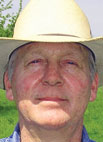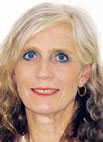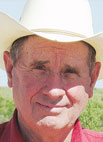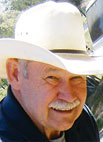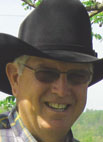Love of Caprines Takes Hold
Donna and Norman Corkle encouraged their two daughters to join 4-H in 1995, never knowing it would mean a continuing devotion to dairy goats for the family. Donna explained, “When the girls were little bitty, they decided they needed animals, preferably horses. But our property wasn’t conducive to horses – it’s very hilly and rocky, with lots of brush and shrubs. So after talking with some friends who suggested goats would be ideal, we did some checking around. At the time, my husband worked with a person who raised dairy goats. We took our two daughters to look at her stock, and she told the girls she’d sell them each a goat at a reduced price for their 4-H projects. So we took home an Oberhasli and a pygmy goat.”
Raising Better Cattle
Some cattlemen raise cattle with the consumer in mind, while others focus on the feedlot operator, and still others have their own family in mind. Lonnie McWilliams is a little of everything. Lonnie’s ranch, KD Gelbvieh, is located just west of Sheldon, Mo. KD used to stand for Katie and Dad, and it still does, although “Dad” is the main operator now. When she was in 4-H and FFA, Katie had a lot of success showing their cattle and crossbred hogs. Now, Katie’s kids have their own calves to show. Lonnie and his wife Lora run about 70 cows on their 270-acre farm. Their herd is mostly Registered Red Gelbvieh, though they have a few Charolais and some balancers.
Trotting Through Life
Growing up in the hallowed hills of Kentucky horse country, Joyce Graening was indoctrinated into the horse culture early. Joyce vowed that as soon as she could, she'd have as many horses as possible. When the time came, Joyce fulfilled that dream, though not with the high strung Thoroughbreds she grew up around. Instead, Joyce opted for the steady and versatile Missouri Fox Trotter. After years living just outside of Fayetteville on 15 acres, the Graening's decided to make the move to the 120 acres they owned just outside of Prairie Grove. “They were about to annex us into Fayetteville and we needed more pasture. I had more horses than I had brains,” she joked. “We thought it would take awhile for the house to sell, but it only took two months. The people who bought the house wanted in quickly, so we had to scramble and lived in a travel trailer while our stable and living quarters were completed. There was nothing here; we had to put the road in and everything. We lived in the stable until our house was completed.” Following the willowy, retired professor of Kinesiology around her large stable, you get a feel for why she loves the Missouri Foxtrotter so. The photos that line the walls showcase the versatility of Joyce's horses. In one photo a beautiful dappled grey is shown in Western Pleasure, in the photo beside it the same horse is shown being ridden in a sidesaddle competition, while yet another photo shows the horse in the English class. Joyce currently has 18 Fox Trotters and a BLM mustang in her stable. Comanche, the mustang is the “babysitter” of the group. “Comanche is very smart, and when I wean babies, I just turn them out with him.” Joyce and her husband Jay, a retired professor of mathematics who taught at the University of Arkansas for 33 years, describe the farm as their retirement exercise plan. Between the horses, the 60 or so head of Limousin mixed cattle, and the assorted dogs that they are always taking in, life on the farm isn't exactly the picture of a laid back retirement.
Controlling Their Cattle Market
Located on the Missouri-Arkansas state line is a sight seldom seen in Northern Arkansas today. JW Guffey and his son, Bryan, and son-in-law, Lee Lester, run a cattle feed lot. Most cattle operations in Arkansas now are either cow/calf operations or breeder stock, but almost everyone runs their cattle on open pasture, supplementing as necessary.
Traditions of Quality
TMB Angus Ranch and Breeding Services, owned by Terry and Mary Brown, has been developed over the years to become the premier operation that it is today. They run 50 cow/calf pairs of registered Angus and raise registered Angus bulls on their 200-acre ranch near Leslie, Ark. They sell seedstock by private treaty. Their four grown children, Angela Thornburg, Chris, Terry Jr., and Travis Brown and six grandkids live in several different states.
Both Sheriff and Farmer
Bob Dotson was born into farming. He still owns the 190 acres and the home he grew up in, as well as two other land parcels of 80 and 20 acres, where he keeps approximately 50 cows. He has a mixed breed herd of mostly black Angus. He also puts up 400 bales of hay each year.
The Farming Life
In 1919 Alfred Friend bought a farm in Dade County, Missouri, bordering Stockton Lake, from the Sloan family. It was just under a section of land, at 640 acres. At Alfred’s side during the purchase was his son, J.A. Friend. Together the two began to farm the bottom land. They raised cattle, hogs and row crops of corn, wheat and beans. Alfred lived in one house on the farm and J.A. in another house down the hill.
All-Natural Ways
Scott and Pam Powers believe in supporting local agriculture, and in the process, they're growing the best tasting broiler chickens and meat rabbits in Ozark County, Missouri. Their method is to use no additives or preservatives in raising their animals, and they do it all on their small acreage.
Mixing Cattle and Cabins
Steve and Karen Hamm own 777 acres just five miles west of Alpena, Ark. When they first visited the area, they were living in Phoenix and were on a short vacation. Little did they know that northern Arkansas was destined to become their new home.
Innovation and Sustainability
'Good food' is the slogan of the 65-acre DH Farms of West Fork, Ark. Located on a picturesque hilltop in the Boston Mountains, near West Fork, the DenHerder family farm is a sprawling mixture of pasture and wooded land. The DenHerders work to make the farm sustainable and to operate as a team. The farm is a diverse mixture of livestock and produce, to meet the needs of the local farmer’s market and the interests of the DenHerder family.


